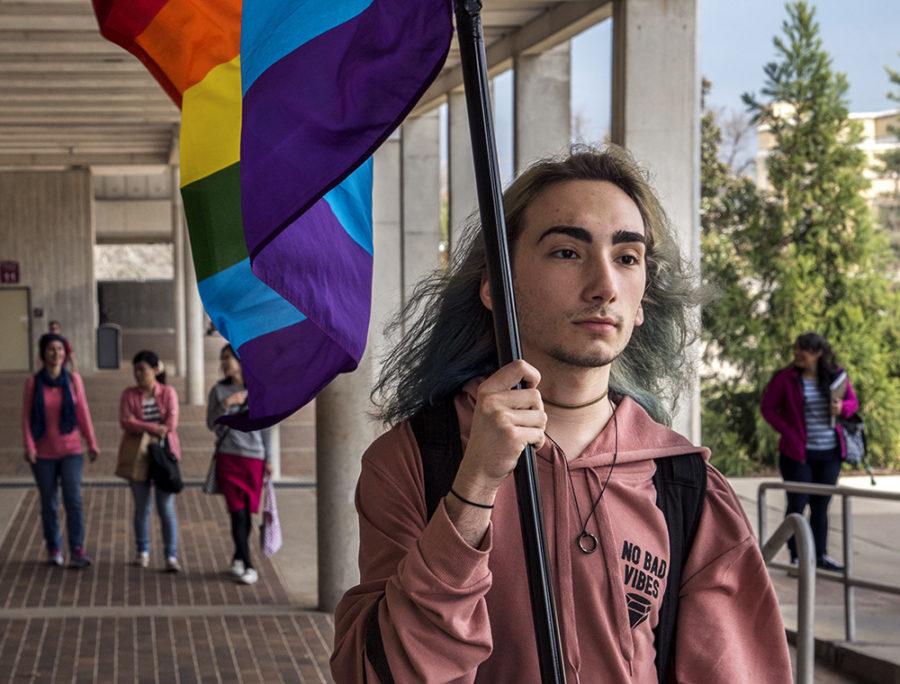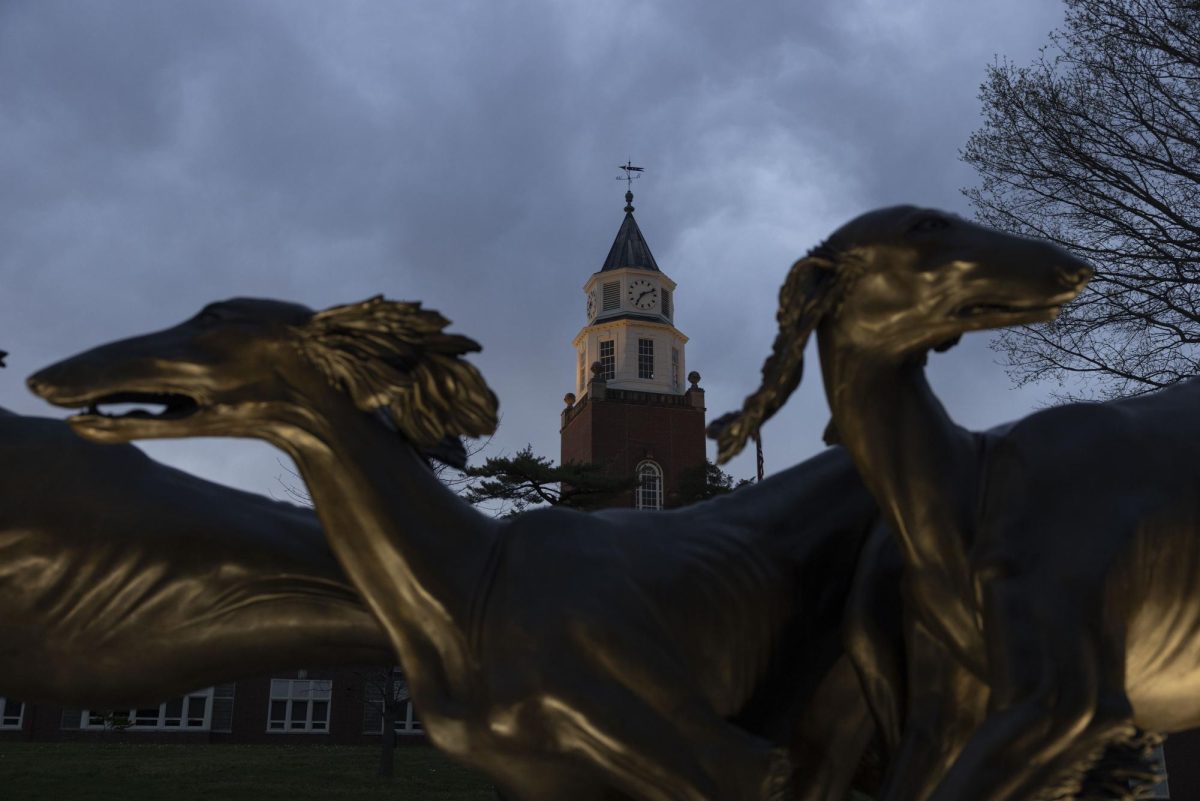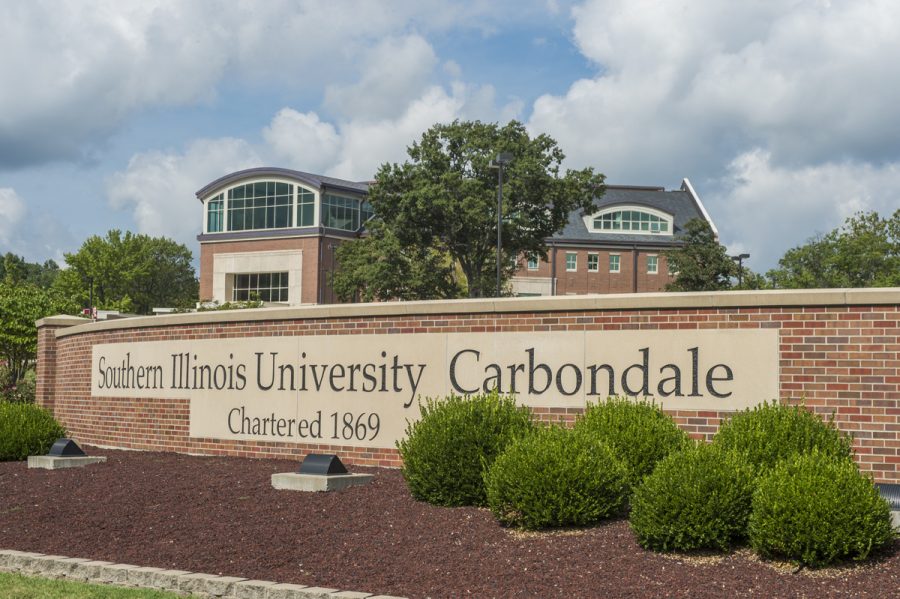LGBTQ student expresses concerns over non-binary facilities on campus
Michael Thornton, a freshman from Naperville studying digital media arts and animation, carries an eight-foot-tall LGBTQ flag by Faner Hall on Monday, March 20, 2017, en route back to Mae Smith Hall after classes. “I’m carrying it for everyone in my community and everyone who supports my community,” Thornton said. (Morgan Timms | @Morgan_Timms)
March 23, 2018
Despite the university’s support services on campus, some members of the LGBTQ student population say they struggle with only having a few non-binary restrooms on campus.
“There aren’t gender-neutral restrooms all over campus which forces me to choose to use the men’s or women’s restroom,” said Michael Thornton, a sophomore from Naperville studying animation.
As previously reported by the Daily Egyptian in 2016, gender-neutral bathrooms were built in Grinnell Hall and Trueblood Hall in response to students’ requests. Vice Chancellor for Student Affairs Lori Stettler said the bathrooms will be closed next year due to the closing of East Campus.
Advertisement
“Gender-neutral restrooms are available at Lentz, on the west side of the dining room on the first floor and accessible from the west doors,” Stettler said.
Thornton prefers to be addressed by they, them and their pronouns because they do not identify as a boy or a girl. When Thornton is perceived as a boy and is addressed by specific gender pronouns, they said it causes them gender dysphoria.
Gender dysphoria can be defined as the condition of feeling one’s gender identity is opposite to one’s biological sex.
Thornton chooses to use the men’s restroom because it’s “safer,” they said.
“There is also the concern of being attacked in the restroom if someone finds out I am transgender, non-binary or queer and they lash out,” Thornton said.
Thornton wishes to bring awareness, pride and community to the LGBTQ community by carrying a transgender flag around campus.
“The blue stripe represents boys and men, the pink stripe represents girls and women, and the white stripe in the middle represents other gender identities such as genderqueer, non-binary and gender fluid,” Thornton said. “Even within the LGBTQIA+ community, the transgender community still faces discrimination and stigma.”
Advertisement*
This is due to stereotypes and misconceptions of how transgenders behave, Thornton said, adding that transgender people often have their voices misheard or ignored.
“When someone refers to me with either he or her, it does not sit right with me and does not feel like those pronouns are true to who I am,” Thornton said.
Thornton said while supportive spaces exist at the university, they are not enough for the LGBTQ community to feel supported or for a non-binary person feel recognized by the university.
“While filling out surveys or forms that ask for my gender, I either have to choose male or female or write in my gender identity,” Thornton said. “Both of these options feed into the erasure of non-binary genders because it enforces that there are only two genders, and anything else is just ‘other.’”
Daniel Drummer, a junior from Chicago studying hospitality, said he created a registered student organization called “Queer People of Color” which provides a space for learning and inclusion.
“The intersectionalities that exist within all of our lives is what makes us different,” Drummer said. “Queer people of color was started because, at the time, I felt as if the issues that needed to be talked about within the community were not being discussed.”
He recalled an experience of prejudice on campus when he lived in the towers. He said someone riding the elevator screamed pro-Trump slogans and called his friend and him the n-word out of their dorm window.
Saluki Rainbow Network member Da’Veon Burtin said there has been some prejudice, and there always will be.
“It’s something we learn to deal with at a young age,” Burtin said. “It’s nothing to get mad about because you can’t force people to change their minds. All you can do is show the person God made you be and walk in your truth. The rest will follow.”
Once Burtin and his friend were beaten outside of a local bar for being black and gay, he said.
“It’s a scary situation because at that moment you have to get over the slanders being thrown at you and fight. The situation would have been very terrible if we would have just given in to defeat. But, at that moment, we had a choice to fight for our lives for one and two for our respect and dignity,” he said. “It’s an experience I will never forget, trying to protect myself, but also trying to protect my best friend.”
Burtin said the police weren’t helpful that night, categorizing the incident as a bar fight instead of a hate crime.
Drummer said he doesn’t recall a time on campus that he felt uncomfortable about his gender orientation.
“Yes, SIU does make me feel supported about my sexual orientation. There are tons of people that I speak to on this campus and they do not make me feel as if I do not belong here,” he said. “It’s all about not being afraid to approach them and giving them the chance to know you.”
Drummer said he’s aware of most of the services on campus and when he needs them he knows who to call.
Burtin said he also has never felt uncomfortable about his gender on campus.
“Coming to SIU, I have been the most comfortable I have been my entire life. I’ve grown in many ways from stepping foot on campus,” he said. “We have Saluki Rainbow Network, whose doors are always open to anyone in need and the office is open at any time if anyone needs to cry about anything.”
Burtin said Carbondale has activities for the LGBTQ community including a drag race at the Street Bar on 213 East Main Street.
“The rainbow cafe for those of young age to 21, their doors are always open, and many more, if you need support we have plenty in Carbondale,” he said.
Staff writer Clair Cowley can be reached at ccowley@dailyegyptian.com.
To stay up to date with all your southern Illinois news, follow the Daily Egyptian on Facebook and Twitter.
Advertisement









